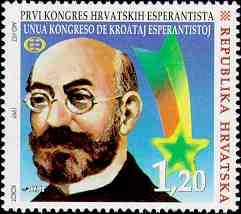
|
Esperanto
Esperanto is the most widely spoken of the constructed languages. A Polack, L. L. Zamenhof, created the foundation of the language in 1887 after ten years of work. His intention was to create an easy-to-learn language, to serve as an international auxiliary language, a second language for everyone in the world (not to replace all existing languages in the world). Some Esperanto speakers still want this, but most just want to meet foreigners and learn about other countries and cultures. Today, thousands of people use it regularly to communicate with people all over the world. According to a survey by Professor Sidney S. Culbert of the University of Washington, 1.6 million people speak Esperanto proficiently.
Of course, this was hardly the last word on the topic. In 1907, a schism in the Esperanto community gave rise to an offshoot named Ido. The Idists had originally intended to hijack Esperanto by presenting their new language as a set of minor modifications to the mother tongue. Nobody fell for this tactic, and Ido is now spoken by at most a few hundred persons.
During a pogrom in 1938, all Esperanto speakers registered in the Soviet Union were exiled to Siberia, because, after all, Esperanto is a plot by the Jews for world domination.
|
|